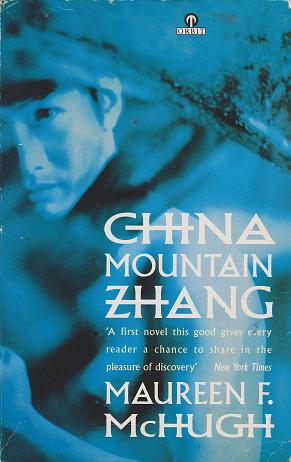
China Mountain Zhang
Maureen F. McHugh
313 pages
published in 1992
China Mountain Zhang is the fourth novel I've read in my Year of Reading Women project. It had been on my shelves unread for over a decade before that, silently accusing me every time I walked past. Some novels are like that, shoved aside each time for a more interesting looking book. Which is one of the reasons I put it on my list of twelve science fiction novels written by women to read this year: to force me to finally read it.
Because I should've read this long ago. China Mountain Zhang was Maureen McHugh's debut novel and was nominated for both the Hugo and Nebula awards in 1992, winning the Lambda Literary Award (best science fiction with LGBT themes), the Locus Award for best first novel, and the James Tiptree, Jr. Award (feminist themed science fiction). It also has always been a highly regarded novel in the fan circles I hang around in. Yet until now I never had even tried to read it, largely because everytime I looked through my bookshelves the cover repelled me. And of course you should never judge a book by its cover, but in this case the cover did seem to promise something worthy but dull I never was quite in the mood for. A bit dumb, because of course China Mountain Zhang turned out to be just as good as its hype had made it out to be.
China Mountain Zhang (just Zhang to his friends and workmates) is an American Born Chinese working as a New York construction tech in the socialist America of the 22nd century, where China has become the dominant world power. His Hispanic mother was one of the revolutionairies that help make the US socialist, which may explains why she named him after Sun Yat-sen, the founding father of republican China, one of whose name translates as "China Mountain". Zhang is not very ambitious, happy to stay in what's a dead end job. Partially this is because it's just not in his character to be ambitious, but what also plays a large part is that he keeps two secrets: the first is that he's not quite genetically Chinese, but had has his genes sculpted to resemble a fullblood Chinese, the second that he's gay.
Which is why he's deeply unhappy when his boss, an exiled mainland Chinese proposes he should get to know his daughter better, with an eye toward marriage, in which case his boss would sponsor him to study in mainland China, something that most people would give their eyeteeth for. Zhang on the other hand, well, he'd like to go there if not for that whole being gay carrying the death penalty thing. Or the fear that if he goes his sculpted genes will be discovered. Or the whole awkwardness and embarrassment of having to go out with somebody he'll never be attracted to. But he does so anyway because going along is easier than refusing. So he takes her to the kite races and to a restaurant, gets her some beers and of course it all ends in tears.
Because of this drama Zhang is forced to look for other work and driven out of his comfortable half-life in New York, first off to a stint at Baffin Island as a construction technician in a Canadian research station, then to mainland China to study. Interspersed with his story are chapters devoted to several other characters, all connecting at some point to Zhang's. And all told in the same quiet, low key way. There's drama in these stories, but it's the drama of everyday life, of people and families struggling to make a living and find a way to survive and thrive in an uncertain future. China Mountain Zhang is that rare thing: a science fiction kitchen sink novel.
And we're so habituated to expect protagonists who, if not the heroes who singlehandedly safe Earth or the universe from which ever evil is threatening it, at least expect them to be eyewitnesses at moments when history changed, or the true meaning of life, the universe and everything is revealed. Zhang is nothing like this, just an ordinary guy trying to make a living and find some happiness in his life. That may even be rarer in science fiction than being gay is...
The world Maureen McHugh has created in China Mountain Zhang is interesting. In some ways it's very much a product of when it was written, with a properly socialist China supporting a revolution in America that figures things like the Cleansing Winds campaign, an obvious callback to China's own Cultural Revolution, as well as a mention of the USSR surviving for much longer than in reality. Yet in the dilapidated vision of America, with its threehundred years old subway trains and a gloriously hightech and strange China, where buses split themselves in half and recombinate at will according to their routes, McHugh shows a world not that far from our own. We're still sort of getting used to China as the new Japan, but you can see McHugh's vision of the future in every Boy's Own technology documentary Discovery Channel runs on the wonderful skyscrapers and high speed trains of Shanghai...
China Mountain Zhang is not just a good first novel, it's a good novel period. What strikes me most looking back on it is the sheer ambition of Maureen McHugh to write such a kitchen sink, slice of life story in a genre not know for its patience with that sort of thing...
Webpage created 28-04-2011, last updated 15-05-2011.